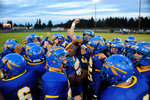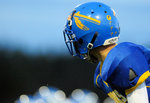


The state’s Board of Education is urging school districts to stop using American Indian mascots. The board passed a resolution last week targeting the Toledo Indians, the Rochester Warriors and about 50 other schools with mascots like redskins or braves statewide.
About 10 schools in Washington state have switched to less offensive mascots over the past decade. But because the board has no authority to mandate the change, schools will face no consequences if they fail to voluntarily make the adjustment.
“Honor and respect is the key to this whole discussion,” said Roy Wilson, honorary chief and spiritual leader of the Cowlitz Indian Tribe. “Some of these things are sacred to our people.”
The issue remains difficult, Wilson said, because on one hand the mascots are an attempt to honor Indian traditions but on the other they do offend some people.
The resolution cited research from the American Psychological Association that documented harm to American Indian children and called for the immediate retirement of all Indian mascots, symbols and images.
“The state board is committed to policies that promote an academic climate where each student feels safe, respected, and ready to learn,” the resolution stated. “Inflammatory mascots are countercurrent to the board’s vision for an excellent and equitable education for all students.”
Student data reveals that the achievement gap for Native Americans is widening, the resolution said. Additionally, Wilson, who for years represented school boards for an inter-tribal organization, said the cultural clash has contributed to the high Native American student dropout rate and other issues.
“Our public schools need to take a deeper look at intercultural problems,” Wilson said. “Many times we major in the minors. And mascots are a minor.”
Wilson said it is far more important to focus on issues like making sure correct American Indian history is taught and ensuring Native American culture is recognized in public schools. Much of Indian history, he said, has been omitted from textbooks, particularly when whites were unsuccessful in dealings with tribes.
“Educationally, historically and culturally, we need to recognize our weaknesses to bring balance to our strengths,” the 85-year-old tribal elder said.
The state Board of Education previously asked school districts to reexamine their policies regarding the use of Native American mascots in 1993.
Bill Iyall, chairman of the Cowlitz Indian Tribe, said his organization and the Toledo School District have a long history of working together to make sure the Indian mascot is used respectfully.
“We were able to work through it in an honoring way,” he said.
Toledo High School Principal Martin Huffman said he understands the board’s reasoning for the resolution, but local traditions and tribal support deserve consideration.
“We’re proud to be the Indians and they’re proud to have us,” Huffman said. “There’s no disrespect.”
Iyall said whether a American Indian mascot is insulting or not depends on the context and some like braves and redskins are more distasteful.
“They tend to stereotype native people as savages,” he said. “That’s the most offensive.”
Rochester Superintendent Kim Fry said the district did consult with the Chehalis Tribe years ago regarding the Warrior mascot and tribal leaders did not ask for changes at that time.
“The most important thing to remember is that the practice of adopting Native American mascots originated out of respect,” she said.
Fry said the district has been reexamining the issue since last May when Oregon banned all American Indian mascots and gave the eight schools affected five years to comply.
While the Oregon law is the most restrictive nationwide, she said, it allows schools to keep the warrior mascot if Native American references are removed.
“Warriors, in particular, aren’t really something that gets my blood pressure up,” said Mary DuPuis, a member of the Chehalis Tribe. “The targets of the mascot changes are probably not Rochester and Toledo.”
Still, Rochester is considering making the expensive transition and has removed sacred symbols such as the Indian headdress in effort to make the logo less offensive.
“We’re always going to be warriors but we may have a different representation of what that is,” Fry said. “We want all students and parents to feel respected.”
•••
Amy Nile: (360) 807-8235
The Associated Press contributed to this report